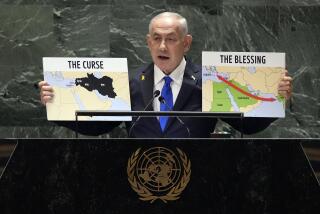Mideast Summit Stirs Rejoicing and Rejection
- Share via
RAMALLAH, West Bank — While Israeli Prime Minister Benjamin Netanyahu arrived home from the Washington summit to a hero’s welcome from his right-wing constituency in Israel, Palestinian leader Yasser Arafat did not come home at all Thursday.
Netanyahu’s supporters lined the highway from Tel Aviv to Jerusalem with banners thanking the hard-line prime minister for not “caving in” to U.S. pressure to make concessions for peace.
Arafat’s adherents, meanwhile, roamed the streets of Ramallah licking their wounds while their leader consulted allies abroad.
Tofiq Anda, 25, waved his plastered left arm--the one that took a bullet in last week’s clashes with Israeli soldiers--to dismiss the summit as a failure for concluding only with an agreement for more negotiations beginning Sunday. Notably, however, he was not using his good arm to throw stones.
“From here to Sunday, we have promised to give Arafat a chance,” said Anda, a member of the Palestinian leader’s Fatah organization.
Like Anda, tens of thousands of Palestinian teenagers and young men heeded President Clinton’s plea to give negotiators time.
Aside from a few skirmishes between Israeli police and Palestinian demonstrators, the region was relatively calm Thursday. The emergency summit seemed to have taken the wind out of the sails of Israeli-Palestinian clashes, and the scheduling of a follow-up meeting seemed to have prevented another immediate explosion of violence.
The question is for how long.
The two-day summit--the first meeting between Netanyahu and Arafat after Israeli-Palestinian gun battles left at least 75 dead and more than 1,000 wounded--failed to resolve any of the substantive issues that led to the fighting in the first place.
As Arafat flew to Morocco, Tunisia and France, Israeli officials openly rejoiced over the results of the summit, while the Islamic Resistance Movement, known as Hamas, issued leaflets calling for “confrontations” with Israeli troops.
“I think this is the first prime minister who stood his ground, stood by the national interest and didn’t fold, grovel or flatter,” Agriculture Minister Rafael Eitan said of Netanyahu on Israel Radio.
Hamas responded by urging Palestinians to go out after Friday prayers and--in marches and confrontations with Israeli forces--continue their “sacrifices and martyrdom” in defense of Muslim holy sites.
The group, which has long opposed the Israeli-Palestinian peace accords, raised the specter of conflict among Palestinians with a warning to Arafat’s police forces to refrain from obstructing “the national and Islamic forces that are determined to continue the military and popular resistance.”
Hamas’ political base has been weakened since it launched a wave of deadly bombings in Israel last spring that caused a freezing of the peace process and helped Netanyahu into office. Arafat and his security forces also won popular support for defending Palestinians against Israeli troops. But that support could quickly turn around if Palestinian police were to clash with their own people.
Since Arafat was nowhere to be heard on Palestinian radio and television during the day, Netanyahu stepped in to try to fill the void. He went on Israel’s Arabic television to urge Palestinians not to lose hope.
“Do not despair, you are not dealing with someone who wants to stop the process,” he said.
Palestinians were not convinced.
Many believe that the crisis over the peace process was provoked by Netanyahu’s refusal to implement the peace agreements signed by his predecessor and by his declarations that he will not negotiate issues such as Palestinian statehood and control of East Jerusalem.
The Palestinians want the eastern portion of Jerusalem as the capital of an independent state.
The violence erupted last week after Netanyahu authorized the midnight opening of an archeological tunnel in Jerusalem’s Old City near the foundation of the area known to Jews as the Temple Mount and to Muslims as Haram al Sharif.
Palestinians believe that Israel was creating “facts on the ground” to cement its control over Jerusalem.
In Washington, Arafat was unable to secure any of the concessions he sought: a date for the redeployment of Israeli troops from the West Bank city of Hebron, a timetable for the implementation of the rest of the agreements and the lifting of a choking military closure on Palestinian self-rule areas that was imposed after the battles last week.
After Palestinian and Israeli security officials agreed to cooperate to keep the West Bank calm, Israeli Defense Minister Yitzhak Mordecai ordered some of Israel’s tanks moved back from the outskirts of Bethlehem. But he decided to leave the state of emergency in place throughout the West Bank and Gaza Strip. Tanks remained stationed by Israeli checkpoints on the outskirts of other Palestinian cities, which Palestinians were prohibited from leaving.
The strict military closure means that Palestinians may not leave their cities and, in some cases, their villages.
In Ramallah, large numbers of police worked to keep tensions down among the bored and unemployed men locked into the city. The security forces had orders to keep the peace, and most men seemed willing to comply for the day.
Drinking mint tea with friends and reading Arabic newspaper accounts of the summit, 26-year-old Imad Mustafa said: “We will follow Arafat, but if he doesn’t show us anything concrete, we will straighten the road down which he is leading us.”
Mustafa said the test will come Sunday, when Palestinians watch for a signal that negotiations are headed in the right direction.
That test holds for Netanyahu too.
Just as the Palestinians will be monitoring the performance of Arafat’s aides, the prime minister’s elated supporters will expect his team to stand firm at the Erez checkpoint on the Israel-Gaza Strip border, site of the talks, as he did in Washington.
More to Read
Sign up for Essential California
The most important California stories and recommendations in your inbox every morning.
You may occasionally receive promotional content from the Los Angeles Times.













